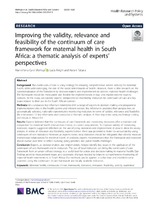| dc.description.abstract | Background: The continuum of care is a key strategy for ensuring comprehensive service delivery for maternal
health, while acknowledging the role of the social determinants of health. However, there is little research on the
operationalisation of the framework by decision-makers and implementers to address maternal health challenges.
The framework should be measurable and feasible for implementation in low- and middle-income country
contexts. In this study, we explore experts’ perspective on monitoring indicators for continuum of care and key
issues related to their use in the South African context.
Methods: We conducted key informant interviews with a range of experts in decision-making and programme
implementation roles in the health system and relevant sectors. Key informants provided their perspectives on
systematically selected, nationally representative monitoring indicators in terms of validity, relevance and feasibility.
We interviewed 13 key informants and conducted a thematic analysis of their responses using multi-stage coding
techniques in Atlas.ti 8.4.
Results: Experts believed that the continuum of care framework and monitoring indicators offer a multisectoral
perspective for maternal health intervention missing in current programmes. To improve validity of monitoring
indicators, experts suggested reflection on the use of proxy indicators and improvement of data to allow for equity
analysis. In terms of relevance and feasibility, experts believe there was potential to foster co-accountability using
continuum of care indicators. However, as experts stated, new indicators should be integrated that directly measure
intersectoral collaboration for maternal health. In addition, experts recommended that the framework and indicators
should evolve over time to reflect evolving policy priorities and public health challenges.
Conclusion: Experts, as decision-makers and implementers, helped identify key issues in the application of the
continuum of care framework and its indicators. The use of local indicators can bring the continuum of care
framework from an under-utilised strategy to a useful tool for action and decision-making in maternal health. Our
findings point to measurement issues and systematic changes needed to improve comprehensive monitoring of
maternal health interventions in South Africa. Our methods can be applied to other low- and middle-income
countries using the continuum of care framework and locally available indicators. | en_US |

